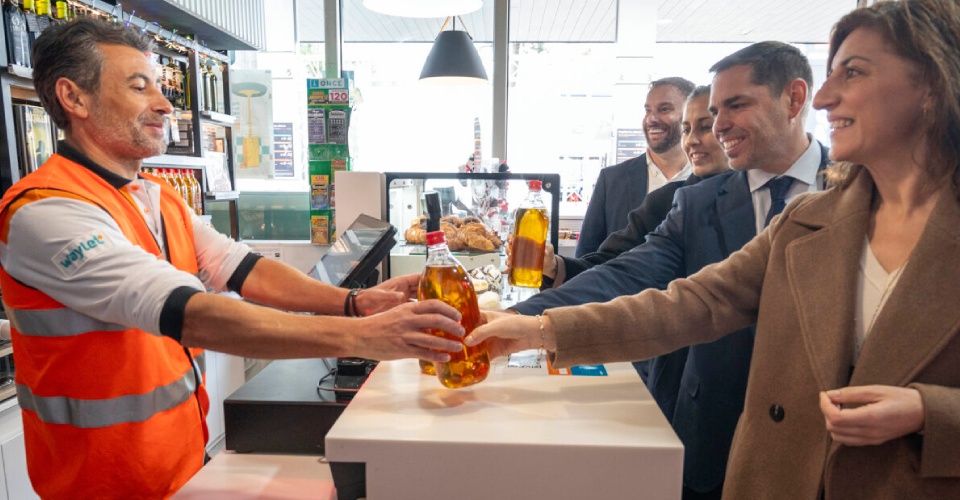Repsol collects used cooking oil at its service stations in Galicia to produce renewable fuel
- The company has set up collection points for used cooking oil at 176 service stations in the Autonomous Region of Galicia in northwestern Spain to make it easier for its customers to manage this domestic waste sustainably.
- Repsol collaborates with the regional government in Galicia to promote this initiative, which is part of the agreement signed between the two entities to promote the transition to a new energy model in the region based on the circular economy and decarbonization.
- Mulleres Colleiteiras, una cooperativa gallega sin ánimo de lucro formada por mujeres en situación de vulnerabilidad se encargará de la recogida y gestión del aceite usado depositado en las estaciones de servicio de Repsol en Galicia.
- The multi-energy company thus promotes the circular economy since this waste is used as raw material to produce renewable fuels. Repsol supplies 100% renewable fuel in Galicia at the Coirós service station and will soon open a second one in the city of Vigo.
Repsol launches 176 collection points for used cooking oil at its service stations in the Autonomous Region of Galicia in northwestern Spain. This initiative, which is carried out in collaboration with the regional government in Galicia (Xunta de Galicia), is an example of circular economy as it allows the sustainable management of this domestic waste that, once treated, will be reused to produce 100% renewable fuels.
In August, Repsol and the Xunta signed a general collaboration protocol for the development of the circular economy in Galicia. The second vice-president of the Xunta, Ángeles Vázquez, presented this project today together with executive managing director for Industrial Transformation and Circular Economy at Repsol, Juan Abascal, and the director of the Repsol Industrial Complex in nearby A Coruña, Natalia Barreiro. The event was also attended by the territorial delegate of the Xunta de Galicia in A Coruña, Gonzalo Trenor, the general director of Environmental Quality, Sustainability and Climate Change, Sagrario Pérez, the councilor of Environment of the city of A Coruña, Noemí Díaz, and Sofía Vázquez, representative of Mulleres Colleiteiras, a cooperative authorized for the collection and treatment of used cooking oil.
With this initiative, Repsol facilitates the sustainable management of this waste and promotes the circular economy by subsequently reusing the used cooking oil as a raw material to produce renewable fuels. One liter of used cooking oil produces 0.9 liters of renewable fuel.
Customers can take their used cooking oil to any of the 176 collection points available at Repsol service stations that currently offer this service in the Galician region, which will soon be extended to 185 collection points. Users of the Waylet application can also benefit from a discount of € 0.30 per liter of used cooking oil delivered to the points available in Galicia, for the next refueling or the purchase of other products in the company's more than 3,300 service stations in Spain.
For the proper management of this waste after collection, Repsol has contracted Mulleres Colleiteiras, a non-profit cooperative from A Coruña formed by women in vulnerable situations. This organisation is certified under the ISCC EU scheme, which guarantees the traceability and sustainability of the waste.
The region of Galicia is the second in Spain in which Repsol has launched this initiative after the Autonomous Region of Madrid in April of this year.
Repsol already supplies 100% renewable fuel in Galicia at its service station in the municipality of Coirós in the A Coruña province, and it is planning the opening of a next point in the city of Vigo. Repsol currently has more than 40 service stations supplying 100% renewable fuel in the Iberian Peninsula.

Zero net emissions fuels
To decarbonize mobility, Repsol is committed to an energy model that combines electrification, renewable fuels, and hydrogen. All energy solutions must be considered to guarantee supply and reduce emissions as quickly and efficiently as possible.
Renewable fuels are zero net emissions and are therefore a fast, inclusive, and cost-efficient solution for transport decarbonization in the short term. Moreover, they are fully compatible with the existing fleet and with existing distribution and refueling infrastructures, so no additional investment is required for their use.
For more than two decades, Repsol has been processing alternative raw materials, such as vegetable oils and used cooking oils, in its industrial complexes to produce renewable fuels. Renewable fuels are already present in all service stations in Spain, since, in accordance with current legislation, conventional fuels incorporate more than 10% biofuels.
The company’s industrial complex in A Coruña has also been producing biofuels for decades. In October 2021, 500 tons of waste, specifically used cooking oil, were processed for the first time to make renewable diesel. In 2022, the industrial complex in A Coruña used more than 195,000 tons of bio feedstock of different types to make biofuels, and this year it plans to increase the bio feedstock used by 30% to 265,000 tons. In addition, this summer a new infrastructure was put into operation at the complex in A Coruña, which allows the continuous reception of this lipid waste by means of tanker trucks, which until now could only be received by ship.
Repsol has allied with leading companies in the heavy road transport sector in Spain and Portugal, such as Sesé, XPO, Serveto, Havi, Joanca, Carreras, Rhenus, and Luis Simoes, with end customers such as Coca Cola, Freixenet, and Seat; with companies in the passenger transport sector in Spain, such as Alsa and Avanza; with airlines such as Iberia, Ryanair, and Vueling; and it also collaborates with Navantia, to decarbonize maritime transport; as well as with institutions and regional governments such as the Autonomous regions of Madrid, Murcia, Castile-La Mancha, and Aragon, as well as the province of Granada (Andalusia) to promote the use of renewable fuels in mobility.